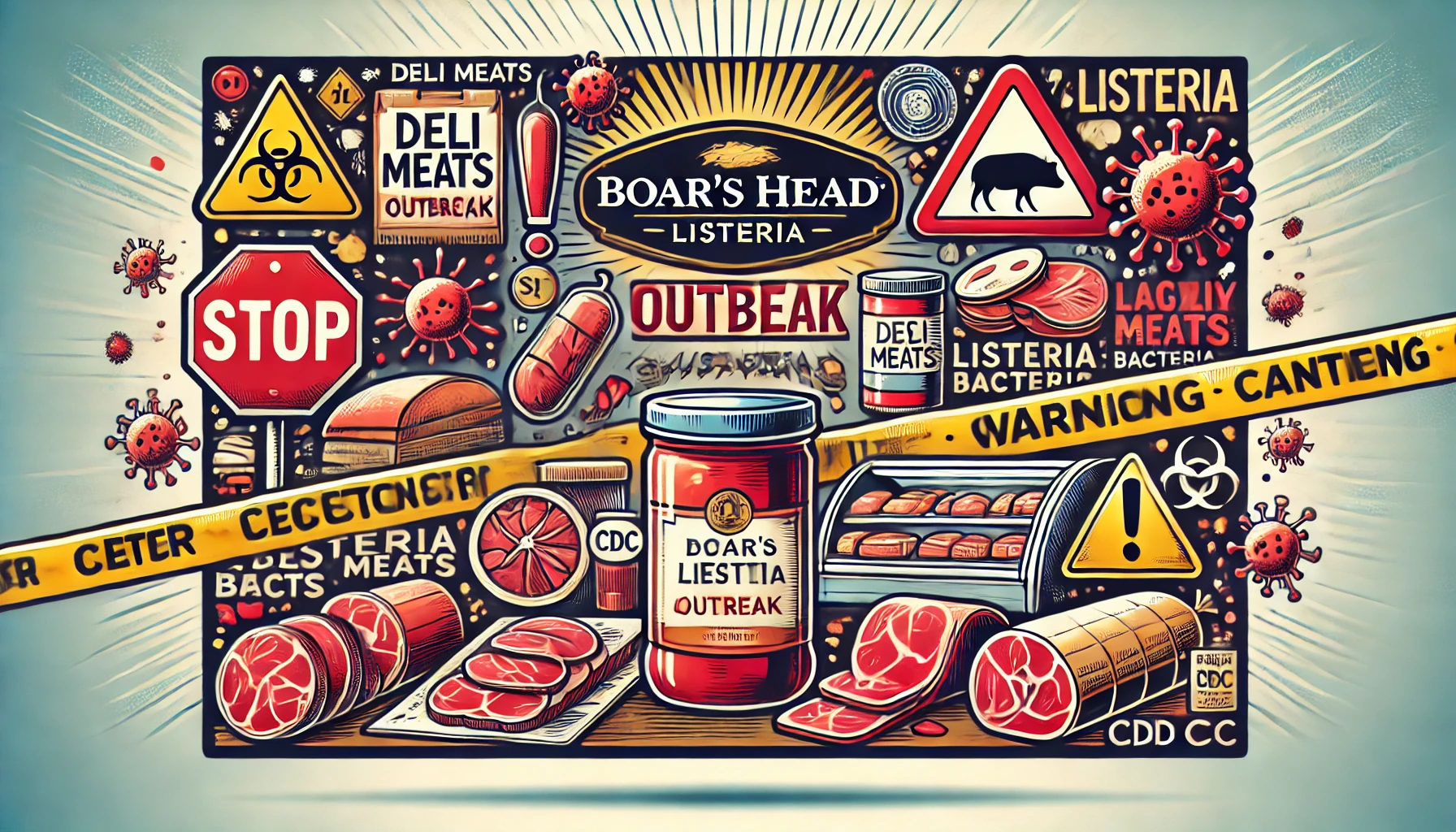Boar’s Head Listeria Outbreak: Latest Updates, Symptoms, and Prevention Tips
In a shocking development, the Centers for Disease Control and Prevention (CDC) has reported the 10th death in the ongoing Boar’s Head deli meat listeria outbreak. The outbreak, which has raised widespread health concerns, highlights the dangers of listeria contamination in deli meats. This situation has led to multiple recalls, as the infection continues to affect vulnerable populations across the United States. Consumers are urged to stay informed and take precautions to protect themselves from further risk.
This article provides an in-depth look at the Boar’s Head deli meat recall, the symptoms of listeria, rising case numbers, and how you can stay safe. We’ll also explain the CDC’s guidance and prevention measures to help avoid future outbreaks.
Understanding the Listeria Outbreak in Boar’s Head Deli Meat
The listeria outbreak in Boar’s Head deli meat has gained national attention due to its severity. Listeria is a type of bacteria that can thrive in refrigerated environments, making deli meats especially susceptible to contamination. This has been a significant concern with Boar’s Head products, which have a long shelf life, enabling the bacteria to remain active for extended periods.
Timeline of the Boar’s Head Listeria Outbreak
The outbreak began earlier this year when Listeria monocytogenes was detected in samples of Boar’s Head deli meats. The contamination has since spread, leading to numerous hospitalizations and now the 10th reported death. The recall initially focused on Boar’s Head deli products sold at various locations, but it has since expanded as more products were found to be affected.
Consumers should be on high alert for products labeled with specific USDA inspection numbers, as these products may still be circulating. Boar’s Head listeria recall has included meats like turkey, ham, and Boar’s Head liverwurst, all of which were potentially exposed to the dangerous bacteria.
Listeria Symptoms: What to Watch For
While listeria infections are relatively rare, they can be deadly, particularly for vulnerable groups such as the elderly, pregnant women, newborns, and individuals with weakened immune systems. It’s important to recognize listeria symptoms early to seek medical attention.
Common symptoms of listeria infection include:
- Fever
- Muscle aches
- Headache
- Stiff neck
- Confusion
- Loss of balance
The symptoms typically appear 1 to 4 weeks after consuming contaminated food, but they can take as long as 70 days to develop. Pregnant individuals should be particularly cautious, as listeria can lead to miscarriage, stillbirth, or serious illness in newborns.
Rising Listeria Cases and Deaths in the US
The CDC has recorded a sharp increase in listeria cases in the US, with the current outbreak being one of the deadliest in recent years. As of the latest report, there have been at least 10 deaths linked to the Boar’s Head outbreak. This marks a grim milestone for a disease that is known to cause severe illness, particularly among at-risk populations.
The CDC continues to monitor the situation closely, urging healthcare providers to remain vigilant and urging the public to report any symptoms of listeriosis if they have recently consumed deli meats. In total, the outbreak has affected dozens of individuals, with a significant number of hospitalizations reported.
Boar’s Head Deli Meat Recall: What You Need to Know
In response to the rising number of listeria deaths, the USDA and CDC have issued warnings and expanded the Boar’s Head deli meat recall. The recalled products have been linked to several grocery stores and delis nationwide. Customers who purchased any deli meats should check the packaging for USDA establishment codes that have been flagged for contamination.
How to Identify Recalled Products
To ensure your safety, avoid any deli meats labeled with the following:
- USDA mark of inspection with codes like “EST. 12612” or “P-12612”
- Products with “sell-by” dates extending into the next few months
What to Do If You Have Recalled Products
If you find any affected products in your refrigerator:
- Do not consume them. Discard them immediately or return them to the point of purchase.
- Clean and disinfect any surfaces or containers that came in contact with the recalled deli meats, as listeria bacteria can survive in refrigeration.
Boar’s Head Liverwurst Recall
In particular, the Boar’s Head liverwurst recall has drawn attention, as it is one of the primary products involved in the outbreak. Consumers who have purchased this product are advised to dispose of it immediately to avoid the risk of contamination.
CDC Listeria Outbreak Warnings and Guidance
The CDC has been actively involved in addressing the listeria outbreak, providing essential information to help prevent the spread of the bacteria. One key aspect of this guidance is for businesses that handle deli meats to follow strict cleaning protocols.
Recommendations from the CDC:
- Thoroughly clean meat slicers, counters, and other equipment used to handle deli meats.
- Ensure deli meats are heated to an internal temperature of 165°F before consumption to kill listeria bacteria.
- Individuals who are pregnant or have weakened immune systems should avoid eating deli meats unless they have been reheated.
For businesses, the CDC has issued detailed protocols to prevent cross-contamination, including deep-cleaning practices and ensuring that recalled products are removed from store shelves.
Listeria Prevention Tips for Consumers
If you’re concerned about the potential for listeria contamination, consider the following tips to stay safe:
- Avoid deli meats unless you reheat them to steaming hot.
- Store deli products at proper refrigerated temperatures (below 40°F).
- Regularly clean your refrigerator and discard any products that may be past their expiration date.
For a more comprehensive guide on how to prevent foodborne illnesses like listeria, visit this CDC resource.
Deli Meat and Listeria: Why the Risk Persists
The persistent risk of deli meat listeria is due to the nature of the bacteria itself. Listeria can survive in low temperatures, making it challenging to eliminate completely from food production environments. Meat slicers, countertops, and storage containers are all potential breeding grounds for the bacteria, even when proper refrigeration is used.
The latest outbreak tied to Boar’s Head demonstrates how quickly such bacteria can spread in deli environments if strict hygiene practices are not maintained. The importance of regular sanitation in delis cannot be overstated, as even minor contamination can lead to widespread outbreaks.
Stay Informed and Safe Amid the Listeria Outbreak
As the Boar’s Head listeria outbreak continues, it’s crucial for consumers to stay informed and take necessary precautions. With the 10th death now reported, the seriousness of the outbreak cannot be ignored. By staying aware of listeria symptoms, understanding the risks of deli meat listeria, and following the CDC’s prevention guidelines, you can help protect yourself and your loved ones from this dangerous bacteria.
For further reading on how food safety impacts public health and how outbreaks like these shape government policy, visit Regent Studies.
Stay up to date on the latest listeria outbreaks and CDC guidance with this official CDC news release.



